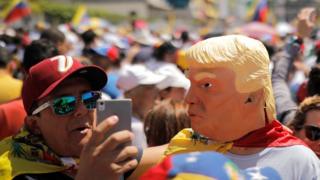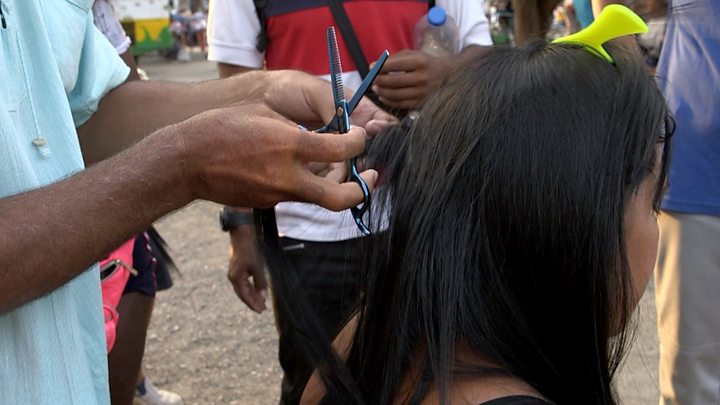Home » Latin America »
Why US sanctions on Venezuela will hurt
The United States announced sanctions this week that are intended to produce the most damage possible to the government of President Nicolás Maduro: the oil sector and its state company, PDVSA.
Up until now White House executive orders were only targeting government officials and certain sectors of the economy. Now new sanctions will finally hurt the one sector that is responsible for more than 90% of the government’s revenues.
Many outstanding contracts are still expected to be honoured in the coming days, but new deals with PDVSA are being subjected to restrictions. From April sanctions are expected to kick in.
A new phase in the Venezuela crisis started last month when Washington recognised opposition leader Juan Guaidó – who is the leader of the National Assembly – as the rightful head of state.
Venezuela’s Congress, which has been stripped of most of its powers by the government, says Mr Maduro is a “usurper”. Washington has embarked on an open campaign with Mr Guaidó to oust Mr Maduro.
What is Washington trying to do?
The White House is trying to do a difficult thing: to make oil revenues directly reach ordinary Venezuelans and bypass the government of Mr Maduro, which owns most of the oil industry through PDVSA.
Sanctions are meant to oust Mr Maduro and lead to new elections in Venezuela.
US National Security Adviser John Bolton says the US wants oil revenue to reach Mr Guaidó, giving his National Assembly some economic power to combat Mr Maduro.
One of the ways of doing so is through PDVSA-owned refineries based in Texas, through a subsidiary called Citgo. Mr Bolton has already met Citgo executives and there is an effort to change its management with executives appointed by Mr Guaidó’s National Assembly.
In effect the opposition is trying to set up a parallel government to Mr Maduro’s with its own cabinet.
Will these sanctions hurt Maduro?
Mr Bolton said the sanctions would block $7bn (£5.4bn) in PDVSA’s assets and more than $11bn in lost export proceeds over the next year.
At this stage, with Venezuela’s oil output on a downward spiral and the country facing severe shortages, sanctions have the power to be “calamitous for Venezuelan finances”, says Helima Croft from RBS Capital Markets.
But some analysts believe Mr Maduro still has a few options.
“The oil that Venezuela currently exports to the US will be diverted to other countries and sold at lower prices. For countries like China and India, the news was akin to Black Monday. They will be able to pick up these oil volumes at great discounts,” writes Venezuelan-born analyst Paola Rodriguez-Masiu, from Rystad Energy.
She adds that the impact of sanctions will be substantially lower than the ones predicted by Washington.
Venezuela exports to the US about 450,000 barrels of oil per day, a little under half of its total output. This is the amount of new oil that will flood the markets. Venezuela’s market share in the US will be up for grabs, favouring Saudi, Mexican and Iraqi oil companies.
Mrs Rodriguez-Masiu says that so far, oil markets have largely shrugged off this new oversupply as investors have been pricing in Venezuela’s crisis for a long time.
Who is supporting Maduro?
China and Turkey are some of the government’s main allies but Russia is today seen as the key player.
Moscow has repeatedly provided financial lifelines to Caracas at times when the country was about to face serious defaults.
But it hasn’t acted purely out of friendship alone.
Russia’s oil company Rosneft (which itself has been subject to US sanctions since 2014 because of the Ukraine crisis) already has a 49% stake in Citgo. It also has some collateral on Citgo, which means it could seize control of the refineries in Texas were Venezuela’s government to run into trouble.
Washington has its own grievances with Russia and it is not happy about the prospects of Rosneft gaining a foothold in refineries in Texas.
Will these sanctions hurt Venezuelans?
It is unclear whether the US can successfully redivert resources from Mr Maduro to Mr Guaidó.
Idriss Jazairy, a special UN rapporteur who reports to the Human Rights Council, says the people of Venezuela are the ones who will ultimately bear the brunt of sanctions.
“Sanctions which can lead to starvation and medical shortages are not the answer to the crisis in Venezuela,” he said.
“Precipitating an economic and humanitarian crisis is not a foundation for the peaceful settlement of disputes.”
Mr Bolton said on Friday that the US would send humanitarian aid, medicine, surgical supplies and nutritional supplements for the people of Venezuela. But it is unclear whether it can successfully circumvent the Maduro government.
How long will these sanctions last?
These sanctions could last for quite a while, and they depend largely on a political solution to the stand-off between the opposition and Mr Maduro.
In the past, the US had been hesitant about imposing sanctions on Venezuela’s oil industry because it knows this has the potential to seriously affect living standards of ordinary people, which are already low.
Now Washington is in uncharted territory, because it still has to work out in detail how to make oil revenues and humanitarian aid reach Mr Guaidó and the National Assembly.
The end goal is to force Mr Maduro out of power either through a negotiated solution or by giving incentives for a military coup.
With Mr Guaidó leading the charge with protests in Venezuela and a wide range of international support – which includes the European Union and regional players like Brazil, Argentina and Colombia – Washington hopes it won’t be long before it achieves its goals.
But these sanctions could be a dangerous gamble.
In the past, US action in Venezuela helped Mr Maduro – and President Hugo Chávez before him – to rally Venezuelans behind a common enemy, giving them a temporary boost in popularity. That could be the case now.
Also, the worsening of living standards now would be directly blamed by Mr Maduro on the US. Furthermore, these actions serve the argument that Mr Maduro has been making: that Mr Guaidó is a mere puppet of the Americans.
Source: Read Full Article




